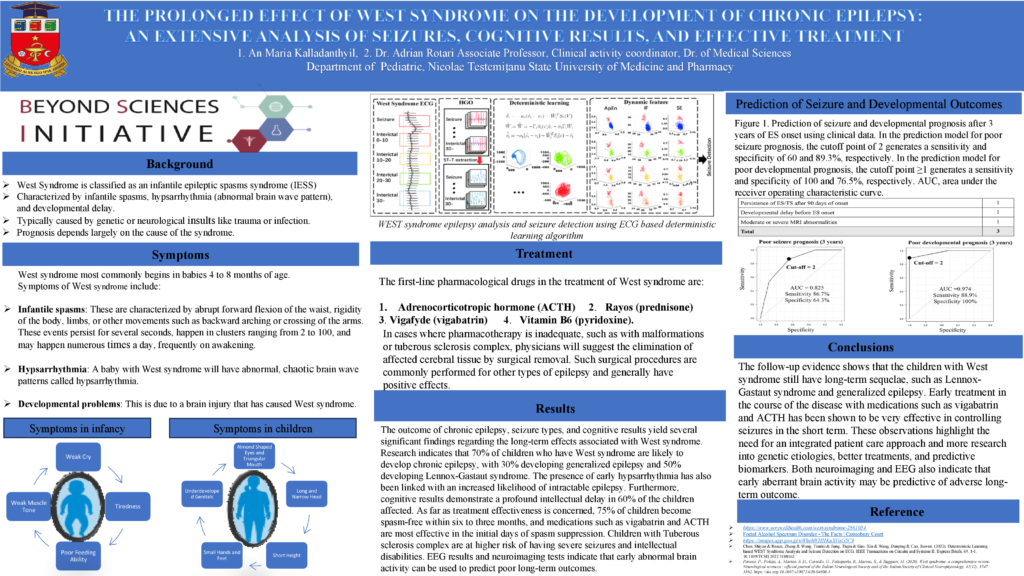An Maria Kalladanthyil
Moldova
THE PROLONGED EFFECT OF WEST SYNDROME ON THE DEVELOPMENT OF CHRONIC EPILEPSY:AN EXTENSIVE ANALYSIS OF SEIZURES,COGNITIVE RESULTS AND TREATMENT
AN MARIA KALLADANTHYIL1,
ADIAN ROTARU 2
1.Nicolae Testemitanu State University of Medicine and Pharmacy(year 6)
2.Associate proffesor and Clinical activity Co-ordinator (department of pediatrics)
Abstract
Background
West Syndrome, also known as infantile spasms, is a rare but possibly life-threatening form of epilepsy in infants under the age of one year. It is characterized by the sudden onset of brief, usually recurrent, spasms or muscle contractions occurring in clusters. One of the most important long-term outcomes for infants with West Syndrome is the development of intractable epilepsy.
Methods
The research is based on bibliographic material that was analyzed using databases like PubMed, Google Scholar, Science Direct, and other online journals published between 2014 and 2024.
Results
The course of chronic elilepsy, different seizures categories and intellectual outcomes leads to several important conclusions about the long-term complications associated with West syndrome. It has been indicated that 70% of children diagnosed with West syndrome develop chronic forms of epilepsy; 30% with generalized epilepsy and 50% with Lennox-Gastaut syndrome. Early hypsarrhythmia has been linked to a higher risk of developing intractable epilepsy. Cognitive outcomes showed significant intellectual delay in 60% of children. According to treatment efficacy, 75% of children were spasm-free at three to six months, with drugs such as vigabatrin and ACTH being most effective in the early days of spasm control.Children diagnosed with Tuberous sclerosis complex are more likely to have more severe seizures and developmental disabilities. Neuroimaging studies coupled with EEG findings show that early aberrant brain activity can be a predictor of adverse long-term outcomes.
Conclusions
The findings indicate that children diagnosed with West syndrome continue to suffer from the long-term effects that come along with this condition. Common long-term effects of infantile chronic epilepsy include Lennox-Gastaut syndrome and generalized epilepsy; however, early treatment with drugs such as vigabatrin and ACTH has been shown in many cases to be markedly effective in the short term in the control of seizures. These results underscore the critical need felt by the medical community for an integrated approach in patient care and the dire need for more research into genetic factors, formulation of more effective treatments, and discovery of predictive biomarkers.Neuroimaging studies coupled with EEG findings show that early aberrant brain activity can be a predictor adverse long-term outcomes.


Leave A Comment